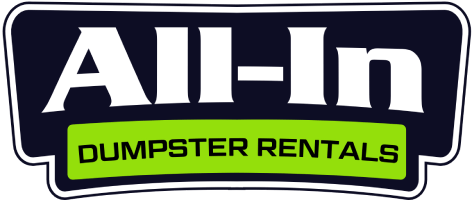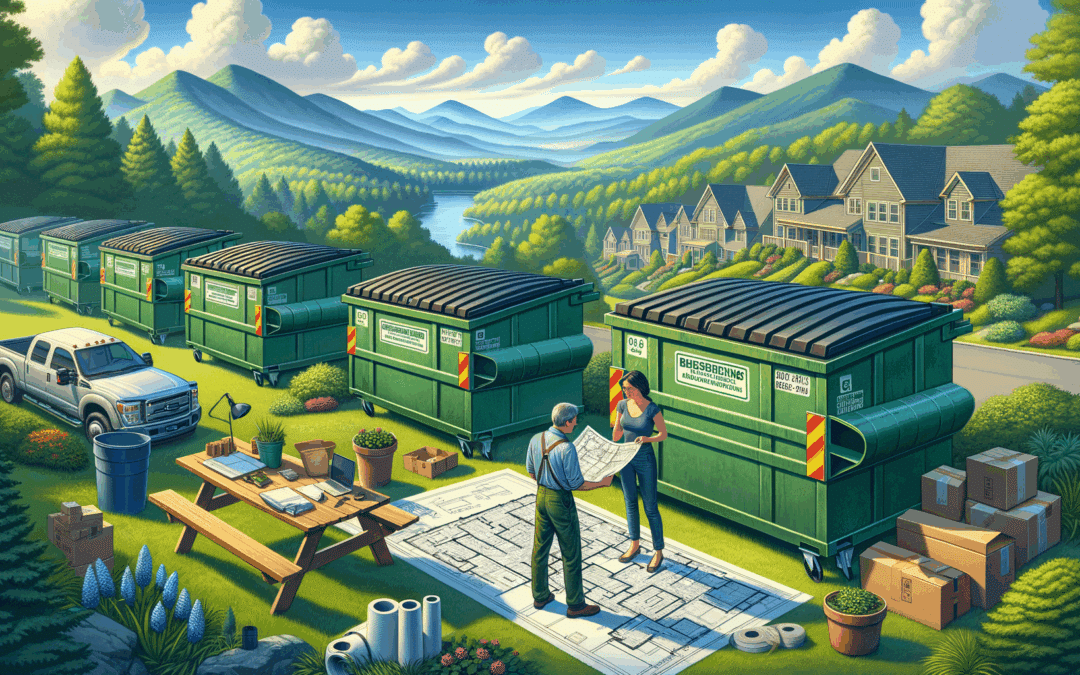When it comes to landscaping in Asheville’s unique mountain terrain, one often overlooked aspect is what to do with all the yard waste. Between seasonal cleanups, garden renovations, and major landscape overhauls, the amount of debris can quickly become overwhelming. Here in the Blue Ridge Mountains, our yards generate distinctive waste – from fallen leaves of our abundant hardwoods to the remnants of rhododendron pruning – that requires thoughtful disposal solutions.
As a family-owned waste management company serving Asheville and surrounding communities like Hendersonville, Waynesville, and throughout Buncombe County, we’ve helped countless homeowners tackle their landscaping waste challenges. The lush, verdant nature of Western North Carolina means our yards produce more organic matter than many other regions, especially during our vibrant fall season when leaves blanket properties across the mountains. Finding the right dumpster solution isn’t just convenient – it’s essential for maintaining our area’s natural beauty.
Understanding Different Types of Yard Waste
Before selecting a dumpster for your landscaping project, it’s helpful to understand what constitutes yard waste and how different materials might affect your disposal needs.
Organic yard waste typically includes grass clippings, leaves, brush, tree branches, plant trimmings, soil, sod, and small stumps. In Asheville’s varied climate, you might be dealing with anything from heavy, water-logged materials after our frequent mountain rains to dry, bulky brush during summer maintenance.
Some yard waste is heavier than it appears. Soil, for instance, can quickly add significant weight to your load. A single cubic yard of soil can weigh up to 2,200 pounds when wet – that’s over a ton! On the other hand, materials like leaves and grass clippings are lighter but take up considerable space, especially when not compacted.
It’s worth noting that certain types of yard waste may have special disposal requirements. For example, invasive plants that are problematic in our Western NC ecosystem (like kudzu or multiflora rose) should be handled carefully to prevent spreading. Some municipalities have specific guidelines for handling these materials.
Small Landscaping Projects: When a 10-Yard Dumpster Works Best
For many Asheville homeowners, the 10-yard dumpster hits the sweet spot for typical yard maintenance and smaller landscaping renovations. This size is particularly well-suited for projects like:
Spring or fall yard cleanups where you’re primarily dealing with leaves, small branches, and garden bed clearing. Given Asheville’s lush tree canopy, these seasonal cleanups can generate surprising amounts of debris, but typically won’t require anything larger than a 10-yard container.
Removing a small garden area or section of sod from your property. Perhaps you’re converting part of your lawn to a native plant garden – a practice many environmentally-conscious Western NC residents are adopting to support local pollinators and reduce water usage.
Trimming and pruning several bushes or small trees, especially after winter damage from ice storms that occasionally hit our mountain region. The 10-yard size easily accommodates branches and trimmings without overwhelming smaller properties.
The 10-yard dumpster’s relatively compact footprint (typically around 12 feet long by 8 feet wide) makes it ideal for Asheville’s often challenging hillside properties and narrow driveways. Many homes in areas like West Asheville, Montford, or North Asheville have limited space for equipment, so this smaller option fits where larger dumpsters simply can’t go.
Medium Landscaping Projects: The Versatility of 13-Yard Dumpsters
When your landscaping ambitions grow beyond basic maintenance, a 13-yard dumpster offers additional capacity without requiring significantly more space on your property. This mid-sized option is perfect for:
Complete garden overhauls where you’re removing old plants, shrubs, and potentially small amounts of hardscaping materials like rocks or pavers. Many Asheville residents find themselves renovating older garden spaces to incorporate more drought-resistant plants as our climate patterns shift.
Removing several medium-sized trees or large shrubs, which is sometimes necessary when managing properties for fire safety – an increasingly important consideration in our mountain communities.
Major property cleanups, especially for those who’ve recently purchased one of Asheville’s older homes and inherited an overgrown yard. The 13-yard capacity allows for significant clearing while still fitting in most residential settings.
The slightly larger dimensions of a 13-yard dumpster (typically about 14 feet long) still allow it to fit in most standard driveways while providing that crucial extra space for bulkier waste. For properties in areas like Biltmore Forest or Weaverville with more spacious lots, this size strikes an excellent balance between capacity and convenience.
Major Landscape Renovations: When to Choose a 15-Yard Dumpster
For comprehensive landscape renovations or larger properties, the 15-yard dumpster is often the most appropriate choice. Consider this size for:
Complete yard redesigns where significant amounts of existing vegetation, soil, and possibly small hardscape elements are being removed. This is common when new homeowners in desirable areas like Black Mountain or Fairview want to put their personal stamp on a property.
Removing several large trees, which has unfortunately become more common as various blights and invasive insects affect some of our native species throughout Western North Carolina.
Clearing brush and undergrowth from larger properties, particularly important for wildfire mitigation in some of our more rural communities surrounding Asheville.
Projects involving both landscaping waste and construction debris, such as when you’re renovating both your home’s exterior and the surrounding landscape – a common project as Asheville’s housing market continues to see older homes purchased for renovation.
While the 15-yard dumpster requires more space (typically 16 feet in length), its increased capacity often means you can complete your project with a single dumpster rather than requiring multiple smaller ones, which can be more cost-effective for larger jobs.
Special Considerations for Mountain Properties
Landscaping in Asheville and surrounding Western North Carolina communities presents unique challenges due to our mountainous terrain. When choosing a dumpster for these properties, keep in mind:
Accessibility issues may limit dumpster placement options. Many mountain homes have steep, narrow, or winding driveways that can’t accommodate larger dumpsters. In these cases, we often recommend going with a smaller dumpster size even if it means scheduling multiple pickups.
Seasonal considerations matter in our region. Spring and fall tend to be the busiest seasons for landscaping projects. Planning ahead and booking your dumpster rental early can ensure availability during these peak times when everyone is cleaning up their yards.
Weight concerns become amplified on mountain properties where soil erosion can be an issue. Wet soil and rocks from hillside landscaping projects can quickly exceed weight limits, so discussing your specific project with your rental provider is essential.
For properties in more remote areas of Buncombe, Henderson, Haywood, or Madison counties, it’s worth checking if there are any access restrictions or additional delivery fees that might apply to your location.
Maximizing Your Dumpster’s Capacity
No matter which size dumpster you choose, getting the most value from your rental means using the space efficiently. Here are some tips specifically for landscaping waste:
Break down larger branches and brush into smaller pieces. This allows for more efficient stacking and prevents large air pockets that waste valuable space. For the stubborn rhododendron and mountain laurel that grow so abundantly here, cutting them into smaller sections is particularly important.
Place heavier materials like soil and rocks at the bottom of the dumpster, with lighter materials like leaves and grass clippings on top. This prevents the lighter materials from being compacted under heavy weight, maximizing your usable space.
Consider composting some of your organic waste if possible. Many Asheville residents maintain compost bins for grass clippings and leaves, reducing the amount of material needing disposal and creating valuable soil amendments for future gardening projects.
For wet materials common after Asheville’s frequent rains, try to allow them to dry somewhat before loading them into the dumpster. This not only reduces weight but also prevents excessive moisture that can create odors or leakage issues.
Environmental Considerations for Yard Waste Disposal
As a community that values environmental stewardship, many Asheville residents are concerned about the ecological impact of their waste disposal choices. When it comes to yard waste, here are some important considerations:
Much of the yard waste collected in proper dumpsters can be composted or mulched at waste management facilities, returning valuable organic material to productive use rather than ending up in landfills. This is particularly important in our ecologically diverse mountain region.
Separating yard waste from other types of debris ensures it can be processed appropriately. When booking your dumpster, specify that you’ll be disposing of yard waste exclusively so it can be routed to the proper processing facility.
Local regulations may prohibit certain disposal methods for yard waste. In Buncombe County and surrounding areas, there are specific guidelines about burning yard waste due to air quality concerns in our mountain valleys, making proper dumpster rental an even more important option.
Some invasive plant species common in our region should be disposed of carefully to prevent spreading. Plants like Japanese knotweed or oriental bittersweet should never be composted at home but should instead be properly disposed of in designated waste facilities.
Planning Your Landscaping Project Timeline
Successful landscaping projects in Asheville benefit from thoughtful planning, including waste management considerations:
Schedule your dumpster delivery to arrive shortly before you begin generating significant waste. In our experience serving Asheville homeowners, having the dumpster arrive 1-2 days before your project starts is ideal.
Consider our region’s weather patterns when planning outdoor projects. Asheville’s afternoon thunderstorms in summer or early spring snow showers can delay work, so building some flexibility into your rental period is wise.
For larger projects, you might want to schedule the dumpster in phases. Many of our customers working on extensive landscape renovations will have one dumpster for the demolition and clearing phase, and then schedule another for later stages of the project.
Remember that rental availability can be limited during peak seasons, particularly in spring when many Asheville residents are tackling yard projects simultaneously. Booking in advance is highly recommended during March through June and again in September through November.
Making the Right Choice for Your Asheville Property
Every property in Western North Carolina has its own unique characteristics and challenges. What works for a flat lot in downtown Asheville might not be suitable for a steep property in nearby Swannanoa or Leicester. Here’s how to make the best decision for your specific situation:
Take accurate measurements of your available space before booking a dumpster. Consider not just the dimensions of your driveway or placement area, but also any overhead obstacles like tree branches that might affect delivery.
Be realistic about the volume of waste your project will generate. Asheville’s lush vegetation often surprises homeowners with just how much debris even a modest pruning project can create.
Discuss your project with knowledgeable local providers who understand Asheville’s unique landscape challenges. As a family-owned business serving this community, we’ve seen just about every type of yard situation Western North Carolina has to offer and can provide guidance based on similar projects.
Consider sharing a dumpster with neighbors for smaller projects. Many neighborhoods in areas like East Asheville or Woodfin have homes with similar yard sizes and maintenance needs, making shared rentals practical for seasonal cleanups.
By selecting the appropriate dumpster size for your landscaping project, you’ll ensure efficient waste removal while maintaining the natural beauty that makes our Asheville community so special. Whether you’re clearing invasive plants to restore native habitat, preparing your yard for fire safety, or simply refreshing your garden spaces, proper waste management is an essential part of responsible property stewardship in our mountain home.

